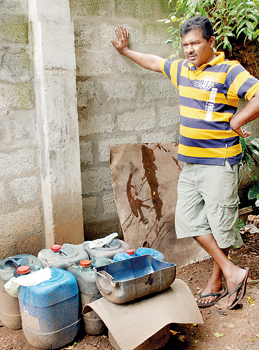News
On collision course: 200 bus strikes so far this year
When protesting bus operators kept their vehicles off the roads on Monday, it was the 200th strike action by them this year but what has not been quantified is the inconvenience such wildcat strikes cause to commuters.
In the wake of the latest bus strike on the Colombo-Panadura route, the Sunday Times learned that these 200 strikes had taken place over issues ranging from bus time tables to fuel hikes, but the minister in charge said they should talk to him before launching their strike without causing inconvenience to the public.
Their Monday’s strike was in support of a demand by private bus operators that the authorities fully implement the regulations governing buses on the Colombo-Panadura route.
Lanka Private Bus Owners’ Association Chairman Gemunu Wijeratne said the authorities were not properly implementing the regulations with regard to both short and long distance buses.
“Private bus owners have trouble with certain drivers who don’t keep up with the time table. Long-distance buses are allowed to drop and pick passengers only in main towns but some violate this rule and stop at every halt. On the other hand, short-distance buses, even if they can stop at every halt, they have to maintain a reasonable speed. Buses which go slow should be fined,” he said.
The strike which lasted half a day ended only after Police Traffic Chief Anura Senanayake gave an assurance that the circular would be implemented in the Western Province.
On February 13, a countrywide private bus strike virtually paralysed the entire country with millions of commuters unable to go to their workplaces or being stranded. The strike that was launched to protest against the fuel price hike was settled only after the Government agreed to raise bus fares by a minimum of 20 per cent.
Again on July 13, private bus owners launched a countrywide strike following another fuel price hike. Justifying the strike action, Mr. Wijeratne had said short-distance operators would have to incur a loss of Rs. 2,000 a day for running a bus and long-distance bus operators Rs. 3,000 because of the fuel price increase.
When the Sunday Times spoke to Private Transport Services Minister C. B. Ratnayake, he said bus owners should give priority to the needs of the commuters. He said theirs was a public service and they should not hold commuters to ransom to win their demands.
The minister said bus owners staged strikes often without prior notice or discussing the issues with the authorities. “If they talk to us in a fair manner, then we can arrive at a solution. But if they threaten us with strikes for the smallest issue, then we too will not feel like offering any solution,” he added.
Minister Ratnayake acknowledged that private bus operators had their problems but these could be solved through negotiations.
But, Mr. Wijeratne disagreed. He said they had often brought their problems to the notice of the ministry seeking a solution and they resorted to strike action only when the authorities failed to provide a solution.
Follow @timesonlinelk
comments powered by Disqus





















